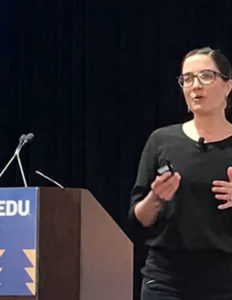
Who you know matters. Depending on their socio-economic and geographic backgrounds, and availability of school resources, students possess vastly different webs of relationships that they can tap into for mentorship, coaching, tutoring, and future career help. If diverging income levels remain the starkest drivers of unequal childhoods, then relationships are arguably becoming the best-hidden asset in the modern opportunity equation. Learn more about how schools and educators can invest in the power of relationships to increase social mobility for students in the pieces below, as well as in the recently released book, Who You Know: Unlocking Innovations That Expand Students’ Networks. And be sure to check out the Who You Know Market Map, a no-login-required website cataloging edtech tools that connect students to new relationships otherwise out of reach.

The other gap that school aren’t talking about—relationships
The NAEP scores released in April set off a flurry of headlines about the sobering state of achievement gaps across the nation. The general consensus? Despite pockets of promise, and slight declines in gaps by race, achievement data reveal that gaps by income have remained relatively flat, or uneven at best.

Mapping the universe of edtech that connects
I’m excited to share a tool that my colleagues and I have been working on for the past few years: a market map of what we’re calling Edtech that Connects. We’ve captured a wide range of edtech tools that are bringing new relationships within reach for students. The tool lives—and will be regularly updated—at whoyouknow.org.

Disrupting opportunity gaps will hinge on networks
Recently, Stanford researcher Raj Chetty came out with yet another new study on the jagged landscape of opportunity facing America. Analyzing the relationship between young people’s exposure to innovation and the likelihood that they would go on to become inventors, the study highlights an alarming rate of what the authors dub “lost Einsteins”: young people who show promising potential but who, due to lack of exposure to innovation, appear far less likely to pursue careers as inventors.

Video: How edtech connects
At SXSW EDU 2018, The Christensen Institute’s Director of Education Research, Julia Freeland Fisher, reveals innovative schools that are creating learning models that strengthen teacher-student relationships, and emerging edtech tools that promise to expand students’ networks to experts and mentors from around world.





